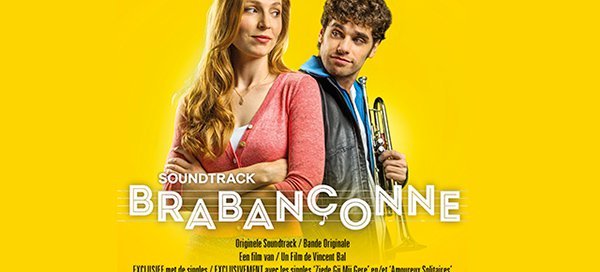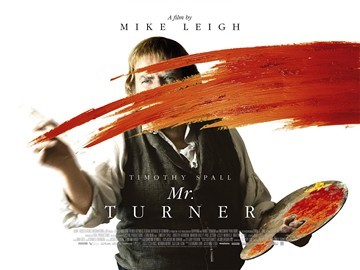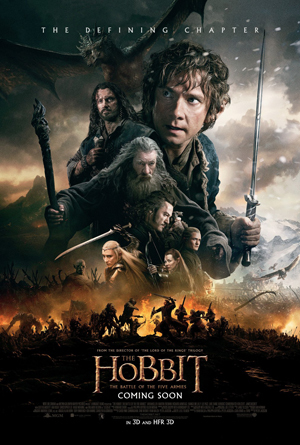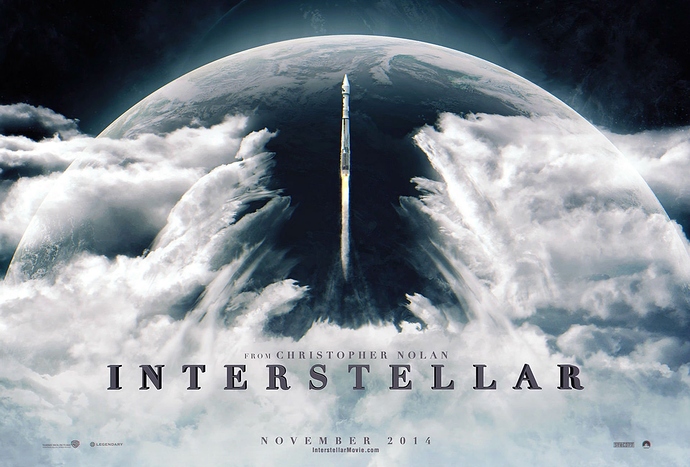I’ve seen about a dozen of those I think, with a definite intention to watch maybe another three (Nightcrawler, Her, Interstellar). My favourite from that lot was undoubtedly The Wolf of Wall Street, with Guardians of the Galaxy taking me entirely by surprise and being superb, as my runner-up.
I always take issue with these lists as to me, 12 Years a Slave and The Wolf of Wall Street as 2013 films, not this year’s. They ought to count it from the film’s first premier, not it’s first showing in the UK. I’ve still to see The Hobbit: The Battle of the Five Armies, so I’ll hold off until then to post my best-of-the-year list.
I don’t watch many brand new movies, but almost all I have seen (Nightcrawler, The Wolf of Wall Street, Interstellar, Blue Ruin, The Raid 2,American Hustle) are on this list, which I guess is to say I have good taste. Or that we all are pretty single-minded and mainstreamed, I don’t know.
Only one that I’ve seen that is not on the list, may as well be the best of the year: Snowpiercer.
These are the ones that I have on the watchlist but didn’t catch them so far: Inside Llewyn Davies, The Grand Budapest Hotel, Her, Gone Girl, Only Lovers Left Alive, The Babadook, Cold in July, Calvary, Under the Skin.
Absolutely. There’s no “to me” about it, those films came out in 2013. 12 Years a Slave and Under the Skin both played at the same festival in August 2013. I guess Empire feel that those movies would fall through the cracks though if they were listed last year in a British publication as among the best of '13 when their readership won’t be seeing them until '14. I dunno. But yes, I agree with you re. to which year a movie should be accredited.
Oh, that’s another one I definitely intend to see.
Moebius
-This Korean film must be one of the sickest films I’ve seen. It’s a black comedy without any dialogue about a boy whose penis is cut off. Film reminded me of Visitor Q and Nekromantik, mostly repulsive but also hilariously funny at times, that is if you have a dark sense of humor.
A ranking of the best films I’ve seen in the cinema in 2014:
- Gone Girl
- The Grand Budapest Hotel
- Interstellar
- Mr Turner
- The Hobbit Part 3: The Battle of the Five Armies
- Edge of Tomorrow
- The Lego Movie
- The Monuments Men

[size=12pt]BRABANçONNE (2014, Vincent Bal)[/size]
A Belgian movie about two brass bands - one from Flanders, the other from Wallony - that are selected to represent Belgium in a European contest; when the Flemish solo player dies in the saddle (after playing his solo), the band leader’s daughter tries to convince the French speaking solo player of the rivals from Wallony, to join the Flemish ranks: she has noted that the guy is not really appreciated by his own band leader (his own brother!) and of course she also has an eye on him (even though she’s engaged to be married)
Not a comedy drama in the line of Brassed Off, but a musical, using classic Belgian hits instead of songs written for the movie. One would say: a typical audience pleaser that will delight the masses and will be rejected by critics, but so far its box-office results have been a major dissapointment (probably too much competition of Hollywood Hobbits & Biblical prophets); at the same time most reviews have been remarkably positive.
Not that great, but a pleasant surprise.
The Homesman - Tommy Lee Jones
A very reduced western, similar to Kelly Reichardt’s Meek’s Cutoff, which shows the west in a way that might be authentic, or at least it seems more authentic than any other western. And both are about women, both are not foreseeable, both give a damn about mainstream audience expectations. In The Homesman (not exactly sure what the term could mean) the women lose there mind or every hope due to the dismal life in the west, in Meek’s Cutoff at least one women turns to be stronger than the men in view of the difficult circumstances.
Both 8/10

Mr. Turner (Leigh/14)
“Mr. Turner” (2014), directed by Mike Leigh, is an unconventional biopic of one of Britain’s finest landscape artists in the Victorian era. Its exceptional on two counts, structurally, when compared to Hollywood biographies, Leigh (who also wrote the film) doesn’t endeavour to fit Turner’s life into a neat three acts, instead, he assembles a morass, a mosaic, of scenes, chronicling the final quarter century of his life. It returns to some characters and not to others, allowing viewers to forge their own understanding of Turner. This leads us to the second unusual aspect of the film: Turner is not a likeable character. Leigh has made no attempt to soften his lead character, from forsaking his illegitimate children to helping having his mother committed to a mental institution, mistreating those around him. Yet this is the film’s strongest trait, Timothy Spall entirely lost in his character, revelling in a performance dominated by a series of richly toned grunts and groans. We’re forced to reconcile the self-centred and insensitive man on screen with the extraordinary art he creates.
The greatness of Leigh’s approach is that he refuses to the separate the two: Turner’s genius as a painter is rooted in his own intense self-interest. In one of the film’s best sequences, he astonishes his contemporaries by impulsively painting a red buoy onto a seascape of his at the Royal Academy; yet this masterstroke is motivated by his egoistical rivalry with Constable (James Fleet), his enmity fuelling his art.
The acting is strong throughout and Spall deservedly won the Best Actor prize at the Cannes Film Festival for his work here. Leigh’s direction is incredibly nuanced and his script has an ear for the verbose, ornate language of the 19th century. Only his caricature of John Ruskin (Joshua McGuire) as a buffoon who misses the point of Turner’s art seems like a misstep. The cinematography by Dick Pope though, cannot be criticised: the whole film is shot and lit so as to appear in the same style as Turner’s painting and this results in a cascade of incredible moments (particularly the appearance of the Fighting Temeraire battleship, which inspires Turner to create one of his masterpieces).
This is a long film and it’s verisimilitude is unimpeachable. If it’s ever impossible to truly like the man then it’s a tribute to Leigh and Spall’s success that at the end of the film, as he lies on his deathbed, for the audience to feel something towards this endlessly contradictory, frustrating, exasperating, brilliant artist.

The Hobbit: The Battle of the Five Armies (Jackson/14)
The final part of “The Hobbit” trilogy, “The Battle of Five Armies” (2014), directed by Peter Jackson, is a hard film to judge. Shot at the same time as its two antecedents, “An Unexpected Journey” (2012) and “The Desolation of Smaug” (2013), for a speculated total cost of $745 million, it really has to be seen in the context of the entire three films. Certainly, Jackson seems to feel this way, the film opening with a direct continuation of Smaug laying waste to Laketown, offering no introduction for those unversed in the saga.
There’s further development of Richard Armitage’s character, Thorin Oakenshield, leader of the band of dwarves seeking to claim the gold under the Lonely Mountain, who descends into megalomania and greed. It’s an intriguing turn and one based in character, which gives an emotional centre that might have otherwise have been lacking. That’s due to the fact that, as per the title, the series’ climatic battle dominates the film. It’s thrilling, masterfully choreographed and the special effects utilised are impeccable but there’s always the danger that the vast armies clashing can become distinctly impersonal. Jackson confronts this by a memorable fight between Thorin and the orc Azog (Manu Bennett) on a frozen river that reduces the conflict to a more thrilling, intimate level.
It seems perverse to comment once more on the scriptwriters (Jackson, Fran Walsh, Philippa Boyens and Guillermo del Toro) lack of faithfulness to J.R.R. Tolkein’s original 1937 novel. From the start, it was clear they weren’t interested in making an accurate version but rather an expansive Middle-Earth epic and the detail surrounding its fantastical environment has always been the films’ strongest suit. Here, the veracity of the characters’ surrounding is compounded by the 3D and the high frame rate (48 frames a second as opposed to the standard 24 used for all other films) that puts the audience truly within the drama unfolding.
The performances are fine, although one wishes that Martin Freeman’s Bilbo Baggins, ostensibly the main character, had more screen time. Jackson is cutting between so many story strands that it feels as though Bilbo gets lost in amidst the web of plotlines. Yet it’s the most succinct of any of the films in the trilogy or The Lord of the Rings for that matter, which this acts as an extended overture to, and there is a certain satisfying quality to the final epilogue bringing to an end a series that has lasted thirteen years. Taken as a whole, “The Hobbit” films may not have reached the same mythic resonance of their forbears, yet when viewed without such retrospective judgement, the films themselves come alive and dazzle the viewer like nothing else.
Birdman (2014) - Alejandro González Iñárritu’s “dramedy” works for about 90% of the time. The cinematography by Emmanuel Lubezki has the appearance that the film has been filmed in one, single stadicam shot, perfect for the movie’s setting in New York’s theatre world. The performances are a real treat, there isn’t a bad note amongst the whole cast, but Michael Keaton is excellent and deserves all the plaudits he’s receiving while Edward Norton is a lot of fun as a conceited, arrogant star. The direction is propulsive and electric, blending its depiction of theatre and the magical realism of Keaton’s inner world seamlessly (the flying sequence delivers a genuine catharsis) but in the final lap starts to loose sight of the other characters (many of the supporting actors seem to mysteriously get lost in the shuffle) and I’m not completely sold on the ambiguous ending. Yet it’s still a very fine work of cinema and will likely reward repeat viewings, Iñárritu’s ambition not falling too short of his reach, packing the film with multiple layers.
Interstellar (Nolan/14)
“Interstellar” (2014), directed by Christopher Nolan, is a wildly ambitious science fiction film, an original film that seems an anomaly in contemporary Hollywood, not based on a franchise or well-known book. With a screenplay written by Nolan and his brother Jonathan, it belongs to the tradition of inquisitive sci-fi, following in the path struck by Stanley Kubrick’s “2001: A Space Odyssey” (1968) and Roger Zemeckis’ “Contact” (1997), seeking to explore deep space and what it holds for humanity. It would be churlish to reveal too much about what McConaughey’s crew find through the wormhole, but suffice to say that the planets they do explore feel grounded in reasonable conjecture that reflects the real risks of interplanetary travel. The film in particular captures both the frightening beauty of space, courtesy of Hoyte van Hoytema’s luminous, beautiful cinematography. One of the film’s most powerful scenes is McConaughey watching twenty-three years worth of recorded messages sent by his children, seeing his daughter Murph grow up in a matter of minutes (played as a child by Mackenzie Foy and as an adult by Jessica Chastain), a devastating commentary on what is known as “spacetime”.
The scenes on Earth are equally compelling, the first act shows a world not so far in the future suffering from a blight that has ravaged crops across the globe. McConaughey and his family live in the American Midwest which is dominated by dust storms; Nolan cleverly intercuts reminiscences from those who survived the dustbowl during the Great Depression to underline the connection with the past.
It’s a sign of Nolan’s standing that he can pull together such a fine cast: Oscar-winner McConaughey is supported by Anne Hathaway, Academy-award nominee Jessica Chastain, Casey Affleck, Michael Caine with Bill Irwin providing the voice of the dryly acerbic robot TARS. Nolan deftly juggles both the spectacle (provided by both models for the spaceships and computer-generated imagery) and the characters, creating a fully-rounded film where we’re invested in the drama of McConaughey longing to return to his children: it’s this trust in emotion rather than the shock and awe of visual effects that gives the film its heart and soul and sets it apart from other Hollywood blockbusters.
Nolan’s film has an aspiration to greatness that shames all other films in its league; daringly original and ultimately moving, propelled by its organ-driven Hans Zimmer score. Its conclusion though may be too pat, more wish-fulfilment than reality. Yet taking the movie as a whole, it’s a forgivable slip in the scheme of a much grander vision.
I think that best thing about Interstellar is its grandeur look and fine combination of the old-school and modern cinema FX. Movie looks amazing, its look is a joy to a fans of SF. But, I think that emotions displayed, which take over later part of the movie, are pure Hollywood blockbuster schmaltz. Love story taped at the end is completely shallow, unnecessary, but predictable if you expect ‘Hollywood’ ending.
Most interesting aspect to me is how this movie relates to debate whether Nolan is a right wing director. Cooper’s farmer son is presented as good-hearted, but narrow-minded simpleton unable to understand higher purpose, and who is obviously less important child to Cooper. “We are explorers, pioneers, not caretakers”, says Cooper making ‘caretakers’ sound like lower form of life, and ‘explorers, pioneers’ sound like conquerors, colonists. There is no talk what caused the catastrophic blight - it’s in nature of the humankind to simply move on on greener territories (which are conveniently unpopulated in the movie, but if we project that idea on Earth…), which can be read as anti-environmentalist message and apology of the politics which doesn’t want to sign Kyoto protocol.
Anyway, that’s what I got from it, maybe it’s an ode to adventurous human spirit and the thing that is really responsible for progress of the humankind (BIG SPOILER: it’s love, of course). 
Nolan may well be a “conservative” director, and I agree the ending was too pat, like a wish-fulfillment. Is it anti-environmentalist? It could be argued that actually it’s a symbolic “blight”, reflecting physically the physic “deadness” of the people on earth, no longer with ambition or the drive to strive forward etc. The Dark Knight seems to be a far more straightforwardly right-wing film: I think it’s intriguing if he is actually, intelligent conservatism in films is a rare thing to come by…
Very good points, I agree more or less. True, The Dark Night RISES was more concentrated on its political agenda (right-wing/conservative, call it what you like), and that movie is the reason I was concentrated on socio-political side of Interstellar. No matter if I share his viewpoints, I agree it was refreshing to see so outrageously right-wing mainstream movie as The Dark Night Rises. Interstellar is more ambiguous and open to various interpretations.
Main objections about Interstellar are aforementioned schmaltzy parts, especially some cringe-worthy lines given to female characters, which draw the slider from more intelligent side to shallow Armageddon-like SF blockbuster.
Birdman or (The Unexpected Virtue of Ignorance) - Alejandro González Iñárritu
And it was amazing. 10/10
Some dialogues are a bit too smart, too clever, or a bit too meaningful. They sound then like theatre, not film. Which is not completely out of place in a film set in a theatre. Not sure if this should be reason enough to drop the entertainometer to a 9/10, but the morning after it feels like a 10er, a film I would like immediately to re-watch.
Apart from that everything is a pure pleasure. Birdman has a grrreat jazz-drum score, the actor’s are excellent, and I can’t believe that the editing wasn’t also nominated for an Oscar. And Iñárritu has freed himself with innovation from the art trap his former films began to grope in. Birdman breathes fresh air.
What did you think of the ending Stanton? I’m still in two minds about it, whether it would have been better to end the film on the stage; although the epilogue certainly aligns the film about other “obsessives” such as in Taxi Driver and The King of Comedy? I really liked Birdman, but a 10 score seems a little too high; too many of the most interesting characters are left unresolved in its final focus on Keaton.
The focus is on Keaton anyway. He’s definitely the lead. All the others are grouped around him, but the film focuses sometimes on them ,whcih means the film is not solely told from Keaton’s point of view.
I loved the ending, the last shot was great. And of course a bit ambiguous. But not too much.
As I said my only complaint is that I had wished in some for more natural dialogues, the acting in these scenes is still very natural. There is too much meaning in these dialogues, I prefer to get this meaning by that what they don’t say.
But apart form that it is a perfect film. The “one shot” style sucks me in and intensifies the mesmerizing impact. In Hitchcock’s Rope it was not a good idea, but here it works smoothly, especially when the time jumps came.
I’ve heard people say the time lapse scenes showing the passing of time were contrived but I felt they worked within the context of the film; and the fluid photography works due to the theatrical setting, we can never “cut away” from a moment, just like in theatre itself. Hey, I like Rope!
Contrived? I have no idea how they could be contrived.
